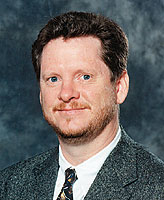| |
 |
| |
© Evanston Photographic
Timothy Feddersen |
| |
|
Faculty
Research: Timothy Feddersen, MEDS
Political
virtuoso
Through an online political simulation, Prof. Timothy Feddersen
is exploring the world of virtual decision-making
by
Kari Richardson
Just days
before a watershed election, Timothy
Feddersen, the Wendell Hobbs Professor of Managerial Politics,
has gone online to track the unfolding contest.
The candidates?
They are students in the Kellogg School professor's undergraduate
seminar on online democracy who have assumed Internet identities
in an elaborate quarter-long political simulation he calls
"Virtua Politics."
As part
of the exercise, Feddersen, who is also chair of the Kellogg
Managerial Economics and
Decision Sciences Department, has assigned each student
a pseudonym to obscure gender and real-life friendships, as
well as two fictional characteristics he calls "ver" and "mer"
to approximate real-life policy positions. These characteristics
are measured on a scale of one to 10.
Students
are charged with organizing into states and electing a leader
— first of their individual state and then of the assembled
"country." Along the way, they receive points based on how
similar their characteristics are to those of their elected
leaders.
Such
simulations are more than just interesting role-plays: They
may help reveal how people make decisions online, an emerging
area of interest with implications for trade associations,
corporate boards, businesses, student groups and even long-standing
political institutions.
"The
problems people encounter when they interact online are significantly
different than those they encounter when they interact face
to face," says Feddersen, whose Virtua Politics simulation
also includes a primitive system of trade.
"We have
thousands of years of experience with democratic decision-making,"
he adds. Far less is known about how relatively new technologies
such as email, instant messaging, Internet access, message
boards and chat rooms affect the outcome of group deliberations.
The Kellogg
School professor first became interested in online decision-making
more than a decade ago, after reading about an Internet-based
community that struggled to implement a democracy after one
member flouted protocol by taking control of others' characters.
More recently, Feddersen has been intrigued by the medium's
ability to connect like-minded groups of people — think
of the money that presidential contender Howard Dean raised
online — but its apparent failure in allowing groups to
forge the coalitions often necessary for political victory.
While
many of the same conflicts and disputes exist between individuals
both on- and offline, the Internet has few of the institutions
the real world relies on to sort out problems.
"To study
the impact of technology on self-governing groups," Feddersen
says, "we needed software that would allow groups to approximate
institutions: to make proposals, discuss them and vote."
Feddersen
partnered with Kellogg colleague Daniel
Diermeier, the IBM Distinguished Professor of Regulation
and Competitive Practice, who was also looking to develop
such a tool, and Northwestern University's Academic Technologies
division. Together, the group produced Ayewear, a software
that allows users to share Web links, send email and instant
messages, visit chat rooms and post notes on message boards.
Among
the many questions ripe for exploration are how groups slog
through the vast amounts of information online to reach consensus
and how leaders emerge to guide decision making in the absence
of face-to-face communication.
Just
a couple months spent observing students complete the online
simulation using Ayewear already has yielded some surprises
for Feddersen—and plenty of areas for future investigation.
If someone had asked him before the academic term began which
type of candidate was most likely to win the simulation's
"national" election, he would have answered a moderate.
That
assumption proved incorrect. A more extreme candidate was
victor, suggesting the importance of social networking and
trade relationships over policy positions.
"It looks
like the candidates who were better positioned to win were
those who successfully made relationships with others using
the software's communication technology," Feddersen says.
"One thing that was surprising was how important instant messaging
was. Of all the online communications, it seems to be the
one that most closely replicates that face-to-face connection
we have when we're talking."
While
Feddersen thinks it's unlikely Americans will elect a president
online for some time to come, the research he will undertake
is likely to have more immediate application for companies,
student groups and corporate boards that embrace the Internet
as a place to decide their futures.
Thus
begins a new history of decision-making that may well span
another few thousand years.
|





